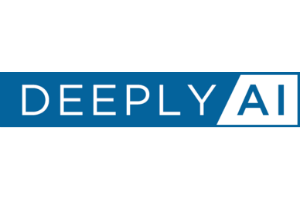Almost all organizations experience some version of the “80/20 rule,” in which a majority of sales are generated by a small subset of the salesforce. Absolutedata Analytics hopes to counter this law with AI. Such intelligence provides power to empower every sales rep., helping predict buyer needs and ultimately allows sales reps to close the deal faster. The product provides each sales person with a customized weekly game plan, allowing them to determine which leads to prioritize and which actions to take (including best channel of outreach for that week, based on a customer’s behavioral data). We posed our famous five questions to to Anil Kaul, the cofounder and CEO of the company. Here’s an edited version of that conversation:
Deeply AI: What are the biggest challenges to AI right now?
Anil Kaul: The rise of AI will be utterly transformative bringing in proven results and higher revenues. The technologies associated with AI, when applied correctly, have massive scope to improve business decision making. The potential is enormous, but, as in any revolution, there will be challenges along the way. I believe some of the major challenges to AI are:
Data quality: The success of an AI solution is directly dependent on the quality of the data that goes into it. To reap complete benefits of AI, companies need to ensure that their data passes the relevance and adequacy test. Is it updated? Has it been extracted from the most appropriate data source? Does the data accurately reflect the customer’s profile? For businesses, a total data cleanup will be the first step in their AI journey.
Bias: As has been proven through many cases through these years, AI can be just as — or even more — biased than humans. Data intake and give out is an important and interdependent process. The problem is, if the information trainers feed to these algorithms is unbalanced, the system will eventually adopt the covert biases that those data sets contain. The input from trainers can be biased from the start, making the whole process prejudiced. The content and output may eventually become more aligned to the biases and preferences of users, effectively shutting them out from other viewpoints and realities that can be out there.
Responsibility: In the era of AI-driven technologies, the lines of responsibility are not as clear cut. ML algorithms are programmed to figure out for themselves how to react to events, and while data gives them context, not even the developers of those algorithms can explain every single scenario and decision that their product makes. This can become an issue when AI algorithms start making critical decisions such as when a self-driving car must choose between the life of a passenger and a pedestrian. When the boundaries of responsibility are blurred between the user, developer, and data trainer, every involved party can play the blame game.
Privacy: AI and ML feed on data — reams of it — and companies that center their business around the technology will grow a desire for collecting user data, with or without the latter’s consent eventually, in order to make their services more targeted and efficient. Unless companies developing and using AI technology regulate their information collection, sharing practices and take necessary steps to anonymize and protect user data, they’ll end up causing harm than good to users.
Inadequate upskilling: The biggest challenge for AI and adoption is not having a proper and skilled team at place. At the time when there is a pressing need to adopt technologies, businesses have not been able to make the most out of the digital revolution due to lack of an upskilled team. Even the pool of properly trained and experienced analysts isn’t enough for implementing and executing analytics. Redundancy of skills, technology or gap between the level of teams’ skills and technology, it will be hindrance to AI.
Acceptance and adoption: AI has shown what all its capable of. However, there is always some resistance to accepting new technologies which makes the adoption much more difficult. Innovations do not win automatic acceptance. It may be overly optimistic to believe that an innovation will sell itself. Any innovation needs to be closer to a need or solution expectation so to get a higher acceptance and ownership from the users. We are yet to see more and more companies to adopt/integrate AI into its blood to see dynamic results.
DAI: How do you see AI developing five years from now?
AK: It’s tempting to believe that artificial intelligence can do just about anything. Robots are coming, let them come in peace. It will eventually redefine industries and build technologies we never thought possible, but business leaders and AI experts say the real value in today’s AI lies in increasing efficiency and accuracy in our everyday work. In five years to come, I see Artificial Intelligence seamlessly mingling into everyday lives in the most invisible ways.
- Humans and the computer will almost become one tightly-coupled cognitive unit to easily take most effective and complex decisions in fraction of seconds.
- AI will help us explore new frontiers and unexplored territories and markets. AI will be able to assess feasibility, profitability and predict near-accurate outcomes for investing in a new venture or opportunity.
- Some of these amazing applications are already here, and it’s making people easier to predict- the essence of machine learning; to learn from the past and predict the future. In the coming times, we will be able to predict it all and correctly- be it weather, natural calamities, market conditions or product quantity demand.
- AI will see faster adoption in the industries where it has not been used widely till now such as education, construction, professional services, healthcare and tourism/travel.
- Applications like Virtual Reality, 3D printing, wearables, sensing and hyper imaging technologies will come into existence and used more widely in various fields like healthcare, climatology, travel and hospitality, medicine, operations and supply chains.
Robots are coming, let them come in peace
DAI: Which AI startups do you think are most interesting right now?
AK: You don’t have to be a champion to let Artificial Intelligence change your game. All it takes to be a star is to take the right step at the right time, or in simple words, take the lead. And a risk like AI is totally worth it. Some of the companies who are really playing the AI game well right now are:
DAI: How do you define AI?
AK: The branch of computer science that deals with making computers behave like humans. It senses for audio processing and computer vision, it comprehends natural language processing and knowledge representation and then it acts through machine learning and expert recommendation system.
DAI: What do you read to stay on top of the AI industry?
AK: The Master Algorithm by Pedro Domingos: It is one of the best reads so far which encompasses everything you need to know about AI. What we’re really searching for with all this AI tech, argues Domingos, is an ultimate “master” algorithm. He writes: “If it exists, the Master Algorithm can derive all knowledge in the world — past, present, and future — from data.” The vision about technology is clearly crafted in this book.
Other than this, Forbes, Technology Review, Harvard Business Review etc. offer some great reading material which gives industry insights, analysis and reports along with current technology trends and predictions for the coming years.
























